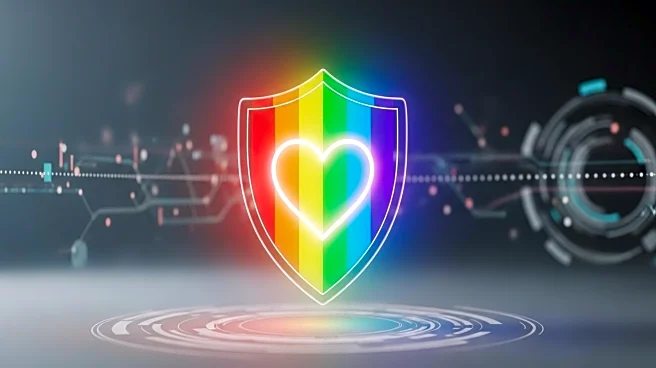What's Happening?
Recent studies conducted by The Trevor Project and Hopelab/Born This Way Foundation reveal that LGBTQ+ youth face increased mental health challenges when they lack access to safe online communities. The research indicates that these young individuals experience higher rates of depression, anxiety, and suicidal ideation or attempts when they do not have supportive digital environments. The Trevor Project's study found that a significant portion of LGBTQ+ youth turn to online spaces for connection, with 38% somewhat agreeing and 36% strongly agreeing that they seek online communities due to difficulties in their daily lives. The Hopelab study further highlights that 44% of LGBTQ+ youth feel very safe online compared to just 9% in person, emphasizing the importance of digital belonging, especially for transgender youth who often face limited acceptance in their physical surroundings.
Why It's Important?
The findings underscore the critical role of online communities in supporting the mental health of LGBTQ+ youth, particularly as they face discrimination and harassment in their daily lives. With over 600 bills affecting LGBTQ+ individuals circulating in the U.S., and laws in twelve states limiting discussions of sexuality and gender identity in schools, these digital spaces offer a vital source of emotional connection and support. However, new internet legislation, such as the Kids Online Safety Act (KOSA), poses potential risks to these supportive environments. While KOSA aims to hold social media platforms accountable for protecting minors, concerns remain about its impact on LGBTQ+ online communities, especially given the changing political landscape and federal oversight.
What's Next?
The reintroduction of KOSA in May, after its previous passage in the Senate, brings renewed attention to the regulation of online spaces. Advocacy groups have expressed concerns about the potential for state attorneys general to determine harmful content for children, which could affect LGBTQ+ youth's access to supportive digital environments. The revised version of KOSA grants enforcement authority to the FTC, addressing some concerns, but the change in leadership under President Trump has reignited fears about federal oversight. As the legislation progresses, stakeholders will need to balance the protection of minors with the preservation of safe spaces for vulnerable communities.
Beyond the Headlines
The broader implications of these studies highlight the ethical and cultural dimensions of internet regulation and its impact on marginalized groups. As lawmakers navigate the complexities of digital safety, the potential isolation of LGBTQ+ youth due to restricted online access could exacerbate existing mental health challenges. The ongoing debate over internet legislation reflects a deeper societal struggle to reconcile the need for protection with the rights of individuals to express their identities and seek community support.










